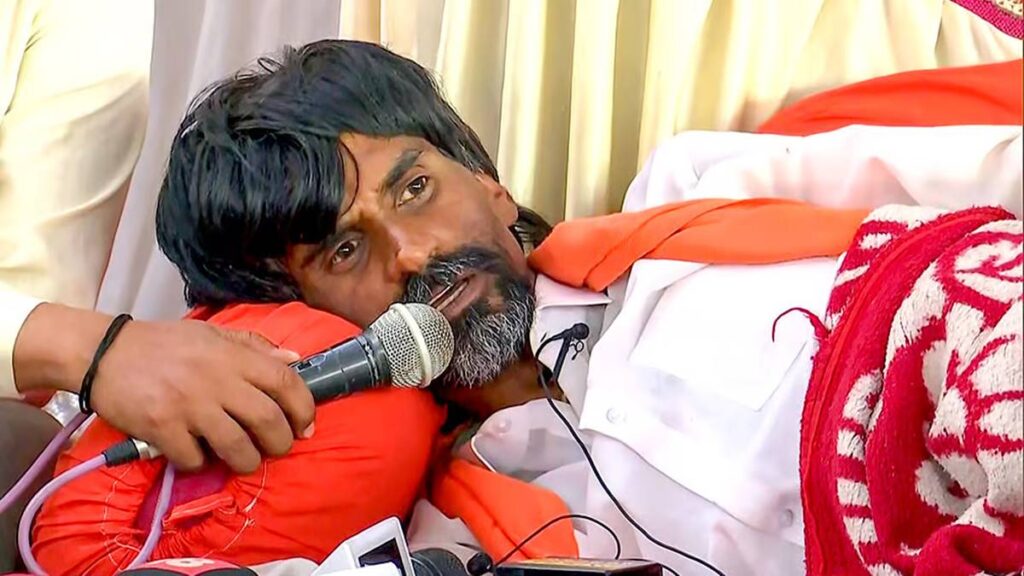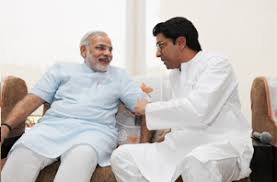Maha Yuti is optimistic about securing 140 seats in the state legislature
X : @vivekbhavsar
Mumbai : According to a reliable source within the ruling Bhartiya Janata Party (BJP), Amit Shah, the Union Home Minister and a prominent leader of the BJP, has turned down the proposal from Rashtriya Swayamsevak Sangh (RSS) to exclude the Nationalist Congress Party (NCP), led by Ajit Pawar, from the Maha Yuti ahead of the state assembly elections. The reports claim that the Maha Yuti has made concessions to the BJP, Chief Minister Eknath Shinde’s Shiv Sena, and the NCP will run as an alliance in the state election.
Amit Shah’s reported decision to reject the RSS’s proposal to exclude the Nationalist Congress Party (NCP) from the Maha Yuti suggests a strategic move to maintain a broad coalition. By allowing the NCP, led by Ajit Pawar, to be part of the alliance, the Maha Yuti aims to consolidate its position and potentially increase its chances in the state assembly elections.
This decision might reflect a strategic balancing act to keep various factions within the alliance satisfied while also addressing broader electoral objectives. The concessions made to the BJP and Eknath Shinde’s Shiv Sena indicate a collaborative effort to present a united front, which can be crucial in the often-complex landscape of state politics.
The RSS’s perspective highlights a significant internal conflict within the broader alliance strategy. According to a senior member of the RSS, the dissatisfaction among BJP cadres regarding Ajit Pawar’s induction into the Sena-BJP-led Maha Yuti reflects deeper concerns about the party’s integrity and political alignments. The RSS member’s remarks suggest that the BJP’s loss in the Lok Sabha elections was perceived as partly due to this controversial decision, which may have eroded trust among party supporters and the public.

The RSS functionary further added that the criticism of Ajit Pawar and the NCP’s inclusion, despite past accusations of corruption, underscores the tensions between maintaining a unified alliance and adhering to the party’s anti-corruption narrative. The timing of Ajit Pawar’s appointment to the cabinet, coinciding with allegations against him, further compounds the discontent among the RSS and possibly other BJP supporters.
RSS desired Ajit’s NCP should not be part of Maha Yuti in the state assembly election. The RSS has directed the state BJP leadership to do something to ensure the NCP will move out of the Maha Yuti before the election. The RSS appears to believe that excluding the NCP could strengthen the alliance’s overall position and align better with the BJP’s and Sena’s anti-corruption stance.
According to the RSS leader, if the NCP is removed from the alliance, the BJP and Eknath Shinde’s Shiv Sena could contest a substantial number of seats individually—190 to 200 for the BJP and 80 to 90 for the Sena. This division would potentially allow the BJP to secure a significant number of seats, estimated at around 140, assuming a 70% strike rate. If successful, it could lead to a more consolidated and potent electoral campaign for the BJP and Shiv Sena, potentially altering the dynamics of the state assembly elections, said the RSS leader.
The RSS’s view was supported by a senior BJP leader from Marathwada and a senior party employee from Pune. Both of them believed that Shinde and Ajit turned liabilities for the BJP. The perception that Shinde, with Delhi’s backing, has become a dominant Maratha leader and has considerable control over BJP politics in the state underscores a potential power struggle within the party. Also Manoj Jarange – Patil factor is working against the BJP and in Shinde’s favor, particularly against Devendra Fadnavis, he pointed out.

The BJP leader asserts that there is a sentiment among BJP workers that the party should contest the assembly elections independently. However, this independence could be seen as risky for the Maha Yuti alliance, especially given the strength and cohesion of the Maha Vikas Aghadi (MVA). The MVA, comprising the Congress, Sharad Pawar’s NCP, and Uddhav Thackeray’s Shiv Sena, is anticipated to remain united and maintain its stronghold. According to the recent assessment, the MVA leads in 155 assembly seats, while the Maha Yuti is ahead in 126 seats. The senior BJP leader suggests that with a strategic approach, the Maha Yuti could potentially close the gap with the MVA by about 24 seats. While there is a significant deficit, it’s seen as manageable with the right tactics and coalition strategies, said the leader and added that a well-planned and methodical approach could allow the Maha Yuti to reduce the gap with the MVA, possibly improving their chances in the election.
According to a recent development in Delhi, Amit Shah turned down the RSS’s proposal to take Ajit’s NCP out of the Maha Yuti. According to the sources, Shah emphasized that Ajit will continue to be the Maha Yuti and that Eknath Shinde will lead the BJP, Shiv Sena, and NCP as their joint alliance in the election. Although this political event is real, Amit Shah’s office did not confirm it. Shah’s stance suggests a commitment to maintaining the current alliance structure, including the NCP, rather than making changes as suggested by the RSS. By affirming that Eknath Shinde will lead the alliance, Shah is likely aiming to present a unified front in the election campaign. Keeping the NCP in the Maha Yuti, despite concerns about Ajit Pawar, suggests that Shah and the BJP central leadership believe that the benefits of maintaining the alliance outweigh the potential drawbacks. It could also be a strategic move to counter the strength of the Maha Vikas Aghadi (MVA) and to avoid any further fragmentation of the anti-MVA vote.
According to the Delhi-based BJP sources, Shah has set goals for each of his three allies in terms of the number of seats they hope to win. The BJP aims to secure 90 seats, which reflects a significant portion of the total seats. Eknath Shinde is tasked with winning 35 seats. Ajit Pawar’s NCP is expected to win 20 seats. This target aligns with Shah’s strategy to ensure that the NCP contributes to the alliance’s total seat count, despite any controversies surrounding Pawar. These goals are likely designed to balance the alliance’s strengths and to optimize the chances of winning a majority. By setting specific targets, Shah is focusing each ally’s efforts and resources on achieving a clear electoral outcome.

The BJP soure said that the involvement of Raj Thackeray’s Maharashtra Navnirman Sena (MNS) and other minor parties in the Maha Yuti’s strategy adds an interesting dimension to the upcoming assembly elections. Raj Thackeray’s MNS, despite aiming to contest all 288 seats, is expected to win around 10 seats. However, the MNS’s participation is seen as strategically beneficial for the Maha Yuti. The MNS’s presence could impact the electoral landscape by drawing votes away from the Uddhav Thackeray-led Shiv Sena and other competitors, thus indirectly aiding the Maha Yuti. By contesting a broad range of seats, the MNS is likely to siphon votes that might otherwise go to Uddhav Thackeray’s Shiv Sena. This could potentially weaken the Uddhav Sena’s position and enhance the chances of Maha Yuti candidates winning in those constituencies.
The support from MNS, Bacchu Kadu, and other minor parties will bolster the Maha Yuti’s ability to form a government. These smaller parties can play a crucial role in securing additional seats and providing the necessary numbers to reach a majority. The MNS’s strategy to contest all seats, while aimed at increasing its own influence, also serves to strategically weaken rival factions.
According to the sources, Bhupendra Yadav, the state in-charge of the BJP, has planned to station himself in Maharashtra after the Parliament session ends. By staying in Maharashtra, Yadav can dedicate his attention entirely to the state’s assembly elections. This hands-on approach allows for more effective oversight of campaign strategies, coordination with local leaders, and responsiveness to emerging political dynamics.
Yadav’s extended stay could serve to boost the morale of BJP workers and allies in the state. It demonstrates a high level of commitment and support from the central leadership, which can be motivating for local party members and candidates. Yadav’s planned stay in Maharashtra underscores the BJP’s focus on securing a strong position in the state assembly elections and highlights the importance of strategic leadership and engagement in achieving electoral success.



where to get clomid without prescription where can i buy cheap clomiphene tablets clomid medication for women can you get clomid pills can i buy clomiphene how to get clomid pill where to buy clomid no prescription
This is a theme which is forthcoming to my fundamentals… Numberless thanks! Quite where can I upon the phone details in the course of questions?
The vividness in this piece is exceptional.
order zithromax online cheap – how to buy flagyl metronidazole 200mg drug
motilium sale – motilium 10mg oral buy flexeril online
buy inderal pill – methotrexate cheap purchase methotrexate pill
order amoxiclav generic – https://atbioinfo.com/ acillin without prescription
order esomeprazole 40mg online – nexium to us buy esomeprazole pills
buy warfarin generic – anticoagulant how to buy losartan
purchase mobic online – https://moboxsin.com/ meloxicam generic
order deltasone 5mg generic – https://apreplson.com/ buy prednisone 10mg generic
cheap ed drugs – https://fastedtotake.com/ buy ed pills generic
order amoxil pill – oral amoxil how to buy amoxil
buy diflucan 100mg generic – https://gpdifluca.com/ buy fluconazole online
cenforce 100mg uk – click cenforce 50mg over the counter
cialis online reviews – https://ciltadgn.com/# does medicare cover cialis
generic ranitidine 300mg – click order ranitidine 300mg for sale
cialis softabs online – strongtadafl can you purchase tadalafil in the us
This is the compassionate of scribble literary works I positively appreciate. site
female viagra – https://strongvpls.com/# viagra 50 mg pill
The thoroughness in this piece is noteworthy. https://aranitidine.com/fr/levitra_francaise/
This is a keynote which is virtually to my callousness… Diverse thanks! Exactly where can I upon the acquaintance details an eye to questions? https://ondactone.com/simvastatin/
With thanks. Loads of erudition!
purchase dutasteride without prescription
buy generic dapagliflozin – https://janozin.com/ forxiga 10mg sale
order orlistat without prescription – https://asacostat.com/# order orlistat
More articles like this would remedy the blogosphere richer. http://www.underworldralinwood.ca/forums/member.php?action=profile&uid=493510
You can protect yourself and your ancestors nearby being alert when buying pharmaceutical online. Some druggist’s websites operate legally and provide convenience, reclusion, rate savings and safeguards to purchasing medicines. buy in TerbinaPharmacy https://terbinafines.com/product/allegra.html allegra
More articles like this would frame the blogosphere richer. TerbinaPharmacy
This is a topic which is forthcoming to my callousness… Myriad thanks! Unerringly where can I find the connection details for questions?
iwin – nền tảng game bài đổi thưởng uy tín, nơi bạn có thể thử vận may và tận hưởng nhiều tựa game hấp
采用高效谷歌站群策略,快速提升网站在搜索引擎中的可见性与权重。谷歌站群
Đến với J88, bạn sẽ được trải nghiệm dịch vụ cá cược chuyên nghiệp cùng hàng ngàn sự kiện khuyến mãi độc quyền.
Đến với J88, bạn sẽ được trải nghiệm dịch vụ cá cược chuyên nghiệp cùng hàng ngàn sự kiện khuyến mãi độc quyền.